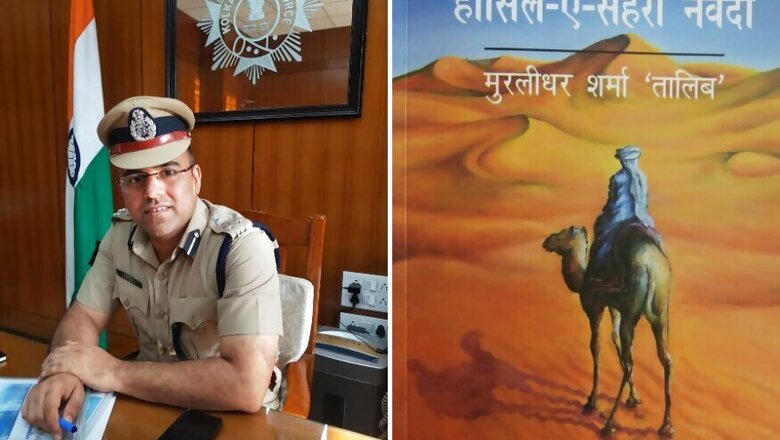In Times When Faiz's Poem Gets Dubbed as 'Anti-Hindu', a Top Cop Bridges Barriers with His 'Shayari'

views
Kolkata: The reading glasses were sleeping down the nose as he was too engrossed while flipping through the pages of a 'confidential crime file'.
On one side, a bulky book on Indian Penal Code — beside a cup of smoking 'Earl Grey' — was kept casually on the tabletop but what could draw anybody's attention was a bunch of 'Urdu newspapers' inside IPS Murlidhar Sharma's office at iconic 18, Lal Bazar Street in Kolkata.
Presently, holding the post of Joint Commissioner of Police (Crime), Sharma, is known as one of the most efficient officers of the Kolkata Police. His excellent command over Urdu literature and 'Shayari' (poetry) makes him popular and different from others – especially when incident of a professor facing protest at BHU for teaching Sanskrit, and Irfan Habib and panel judging Faiz's poem, are hitting the headlines.
Born in July 20, 1977 at Mandi Adampur in Hisar district in Haryana, Murlidhar Sharma is known in the literary world as 'Murlidhar Taalib' because his Takhallus (pen-name adopted widely by Urdu and Persian poets) is 'Taalib' (seeker).
When he was seven years old, Sharma used to listen to the conversation (in Urdu) of his Punjabi neighbours who mainly settled there after partition from Pakistan. “The language instantly touches my mind and heart. I told myself Kuchh to Baat Hai Isme (there is something special in this language). It all started from there,” recalled Sharma.
“I did my ‘Ibtidai Taalim’ (early education) from Government Boys School and Post Graduation from Punjab University, Chandigarh. Later I moved to the Jawaharlal Nehru University, New Delhi for M. Phil. In 2005, I appeared in the civil services examination and got selected for the Indian Police Service (IPS). Post training, I was allocated the West Bengal cadre and my first appointed was as Superintendent of Police of the Birbhum District in Bengal. Later I became the Deputy Commissioner of Police (South Division) and Deputy Commissioner of Police (STF) in the Kolkata Police,” he said.
When asked about his fascination towards Urdu, he said, “Since my childhood I used to listen to the conversation of my neighbours (Punjabi refugee from Pakistan) and used to attend sittings of Urdu poets in my locality. Slowly, I develop a strong bonding towards Urdu language and started writing and reciting few lines as well. However, I was shy to show it to others because it lacks the basic ‘meter’. I am indebted to my college professor Gulyani who helped me in developing more interest towards ‘Shayari’ and the ‘meter’.”
“Beside my formal education, I extensively started reading books on Mirza Ghalib, Daagh Dehlvi, Allama Iqbal, Firaq Gorakhpuri, Faiz Ahmad Faiz. Also, I used to follow a very popular Urdu column ‘Paagal Ki Diary’ in ‘Punjab Kesari’. It was a tough journey due to my profession as a police officer but I would like to thank my college friends who always motivated me. There was a time when I completely detached with the Urdu poetry when I was selected as an IPS officer. But I would like to thank myself that I got posted in Bengal and got police officers like Nisar Ahmed who introduced me to Urdu littérateur Dr Aqil Ahmed. It was him who once again helped me to continue my dream of writing Urdu poetry. Today, I feel proud to have my first collection of Urdu poetry – Haasil-e-Sahra-Navardi (learning through wandering in desert). It is a collection of 100 poems and I dedicated this book to my son ‘Darsh’. Presently, I am working on my second book on Urdu poetry and hopeful that it will be published soon.”
Two years back he penned - ‘Nafrat Ke Zahr Ko Yunhi Badhne Na Denge Hum...Ekbar Fir Se Mulk Ko Batne Na Denge Hum’ (We will not allow hatred, communal disharmony to spread its tentacles in India, We will not allow India to divide once again) and it became viral on social media. While sharing the link, Sharma said, “I wanted to give a message of love, brotherhood and communal harmony through my poem. Someone made it viral on social media,” he said while reciting one of his favourites, ‘Main Junoon Ke Had Batana Chahata Hoon, Phoonk Se Suraj Bujhana Chahata Hoon’. (I would like to tell the limitation of obsession, I want to douse the Sun with a whiff)
When asked about incidents of communal discord in the country, he said, “As ‘Murlidhar Taalib’, I would like to request all to make this world beautiful through love, brotherhood and most importantly through education. In this New Year, let’s shun the path of hate and embrace each other, irrespective of caste, creed, race, religion and language. I try to spread the message of love through my poetry and I will continue to dedicate myself to the service of the people,” he said by ending the conversation with his another poem - “Uski Khamoshi Ek Thehri Hui Jheel Main Patthar Ki Surat Girati Hai Aur Aan-Ginat Mayani Ke Dairey Bana Deti Hai....(His silence is like waves when a stone strikes the calm water surface of a lake).


















Comments
0 comment